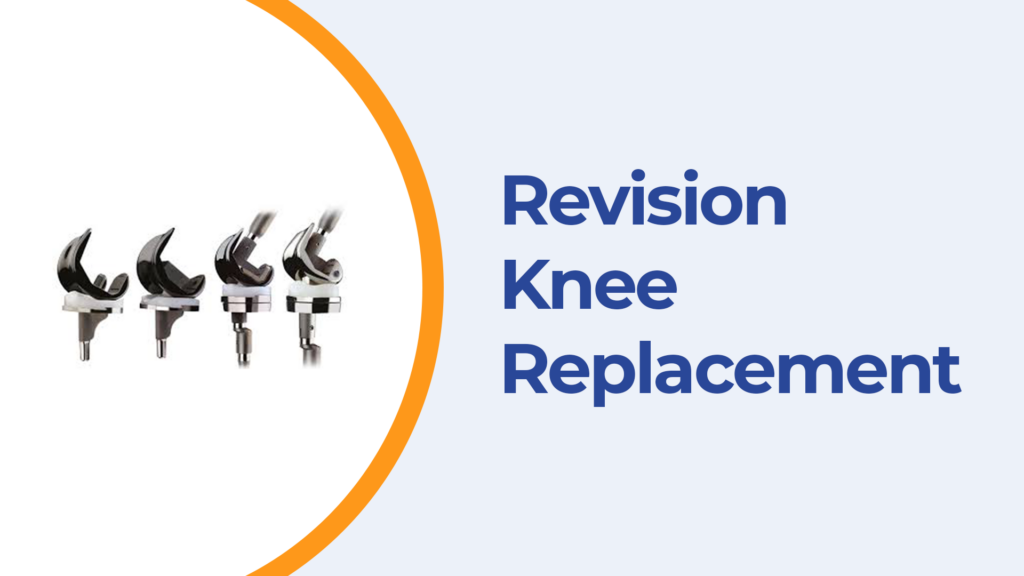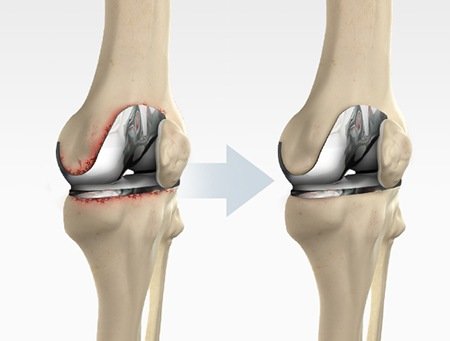Knee Revision surgery
One of the best Knee Revision surgery in Hyderabad with top-notch Knee Revision surgery services. Book an appointment and visit our clinic now for 100% safe and affordable orthopedic surgeries by Dr.Praful.

Services
Methodology
Step 1:
Consultation
Book your appointment through Whatsapp or by dialing up @Mobile Number.
Step 2:
Investigation
The doctor inspects your issue extensively to completely understand the cause and the issues associated with your ailment.
Step 3:
Treatment Plan
A detailed treatment plan is created based on your unique needs and requirements.
Step 4:
Treatment
With each treatment that you undergo, you are advancing towards recovery.
Step 5:
Post-treatment follow up
Our team follows up to keep track of your recovery progress.

What is Knee Revision Surgery?
When a knee replacement no longer functions properly, revision surgery after total knee replacement is often necessary. During this procedure, a surgeon replaces the old device with a new one. Revision surgery should not be taken lightly. It’s more complicated than a primary (or first) Total Knee Replacement Surgery and continues to carry many of the same risks.
Symptoms of Knee Revision Surgery
You will experience specific symptoms if Knee Replacement Revision Surgery is required. Excessive wear or failure symptoms include:
- Decreased knee stability or function
- Increased pain or infection
- A bone fracture or a complete device failure
In other situations, small fragments of the prosthetic device may break off and gather near the joint.
When is Knee Revision Surgery recommended?
Infection after Knee Replacement Surgery can result in serious complications. Typically, bacteria that gather near the wound or inside the device are the reason for this. If your surgeon suspects there may be an issue with your present artificial knee, you will be required to submit to an examination and assessment. However, the following are the typical justifications for having a second Knee Replacement Surgery:
- Joint rigidity
- Non-healing wounds (sutures)
- Joint instability resulting in injuries
- Joint movements that hurt
- Inability to walk independently
- Discharging sinuses
Why Knee Revision Surgery is more complicated than initial surgery
A revision procedure is typically more challenging and complex than the primary Knee Replacement Surgery because the surgeon must eliminate the original implant, which would have been embraced into the existing bone.
Additionally, less bone is left over after the surgeon removes the prosthesis. In some instances, a bone graft may be necessary to support the new prosthesis. This procedure involves transplanting a piece of bone from another part of the body or from a donor. A bone graft provides support and promotes the growth of new bone.
However, more preoperative planning, specialised equipment, and advanced surgical techniques are needed for the procedure. Compared to a primary, initial knee replacement, the procedure requires more time to complete.
How long is the recovery time?
The recovery period following Knee Revision Surgery is not as predetermined as it is after primary knee replacement and can differ greatly from patient to patient. It may take up to 12 months to feel completely better.
The recovery period usually takes up to 3 months or even more, depending on the patient’s condition. Most people will feel at ease going back to work and resuming some of their normal activities three to six months after surgery. However, this may not involve exercise or other physically demanding activities.
What risks are associated with Knee Revision Surgery?
The lengthened recovery time associated with a Knee Revision Surgery
raises the possibility of complications.
Complications after Knee Revision Surgery may include:
- Infection
- Clots of blood
- Dislocation or damage
- Joint stiffness and mobility issues
- General health risks
Your orthopaedic surgeon will go through all the risks in detail to map out the best course of action. They will also give you instructions on how to get ready for surgery to reduce your risks as much as possible.
FAQs
- Joint stiffness
- Non-healing wounds (sutures)
- Joint instability causing wounds
- Painful joint movements
- Inability to walk independently
- Discharging sinuses
About 2 to 3 hours.
The recovery period usually takes up to 3 months or even more depending on the patient’s condition.

